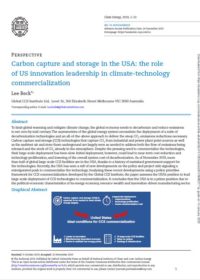Resources
Publications
Our publications, reports and research library hosts over 500 specialist reports and research papers on all topics associated with CCS.
View our Publication Library Disclaimer.
Filter by
Carbon capture and storage in the USA: the role of US innovation leadership in climate-technology commercialization
16th January 2020
Organisation(s): Global CCS Institute
Topic(s): Carbon capture and storage (CCS), CCS protocol, Innovation, United States
To limit global warming and mitigate climate change, the global economy needs to decarbonize and reduce emissions to net-zero by mid-century. The asymmetries of the global energy system necessitate the deployment of a suite of decarbonization technologies and an all-of-the-above approach to deliver the steep CO2-emissions reductions necessary. Carbon capture and storage (CCS) technologies that capture CO2 from industrial and power-plant point sources as well as the ambient air and store them underground are largely seen as needed to address both the flow of emissions being released and the stock of CO2 already in the atmosphere. Despite the pressing need to commercialize the technologies, their large-scale deployment has been slow.
Initial deployment, however, could lead to near-term cost reduction and technology proliferation, and lowering of the overall system cost of decarbonization. As of November 2019, more than half of global large-scale CCS facilities are in the USA, thanks to a history of sustained government support for the technologies. Recently, the USA has seen a raft of new developments on the policy and project side signaling a reinvigorated push to commercialize the technology. Analysing these recent developents using a policy-priorities framework for CCS commercialization developed by the Global CCS Institute, this paper by Lee Beck, our US-based Senior Advisor for Advocacy and Communications, assesses the USA’s position to lead large-scale deployment of CCS technologies to commercialization. It concludes that the USA is in a prime position due to the political economic characteristics of its energy economy, resource wealth and innovation-driven manufacturing sector.
Disclaimer
The content within the Global CCS Institute Publications, Reports and Research Library is provided for information purposes only. We make every effort and take reasonable care to keep the content of this section up-to-date and error-free. However, we make no claim as to its accuracy, currency or reliability.
Content and material featured within this section of our website includes reports and research published by third parties. The content and material may include opinions and recommendations of third parties that do not reflect those held by the Global CCS Institute.
The LCFS and CCS Protocol: An Overview for Policymakers and Project Developers
24th May 2019
Organisation(s): Global CCS Institute
Topic(s): Biofuels / Bioenergy, CCS protocol, Policy law and regulation, United States
The Global CCS Institute has launched a report analyzing California’s recently passed carbon capture and storage protocol. The report provides a summary of the regulation for project developers and policymakers in other states and countries, given the Protocol's global applicability. While comparing it to other relevant regulations – including the federal carbon capture tax credit also known as 45Q – the report seeks to raise awareness for the opportunities created through the protocol and to advance deployment opportunities.
The protocol incentivizes carbon capture and storage projects reducing the lifecycle emissions from bioethanol, hydrogen, and crude, provided the fuel is sold into the California market, as well as direct air capture projects globally.

